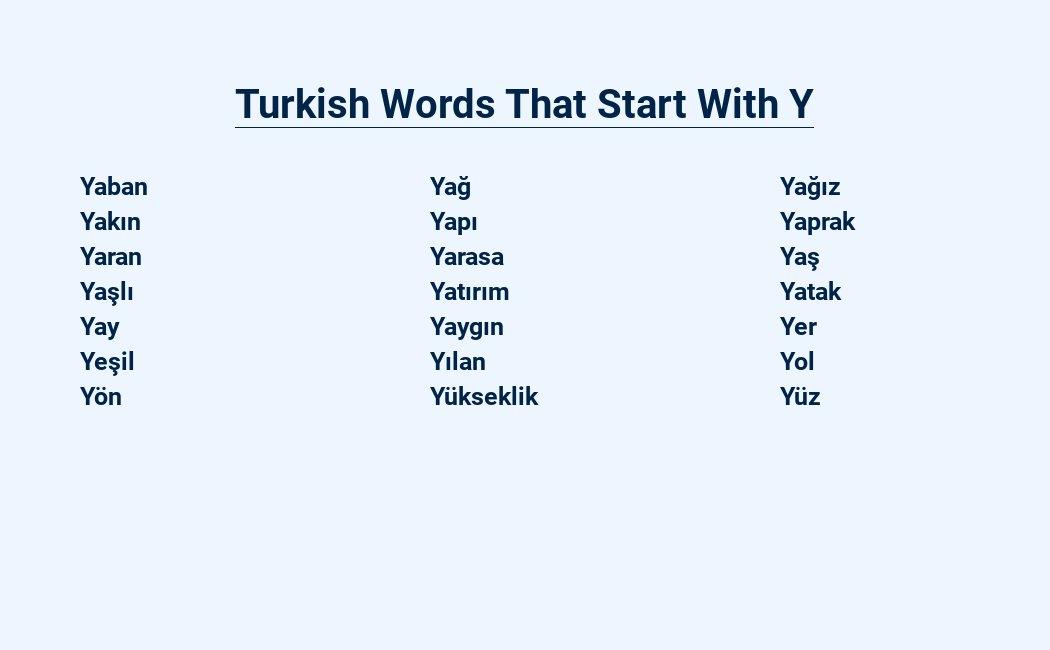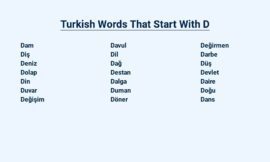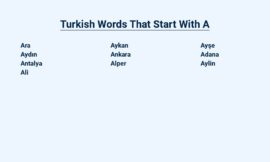Embark on a linguistic journey to discover the richness and beauty of Turkish words that begin with the letter “Y”.
From the rustling of leaves (yaprak) to the warmth of a cozy bed (yatak), these words paint a vibrant tapestry of everyday life and emotions.
Let’s delve into their meanings and explore the unique charm of Turkish vocabulary.
Turkish Words Starting With Y | English Translation |
|---|---|
yağ | fat |
yağlama | lubrication |
yağmur | rain |
yağmurluk | raincoat |
yağsız | fat-free |
yaka | collar |
yakalamak | to catch |
yakın | close |
yaklaşık | approximately |
yakıt | fuel |
Turkish Words that Start with Y
Yaprak
Yaprak is a Turkish word that means “leaf.” It can also be used to refer to a page in a book or magazine.
The word yaprak is derived from the Proto-Turkic word yaprak, which also means “leaf.”
Yalnız
Yalnız means “alone” or “lonely” in Turkish.
It can be used to describe a person who is physically or emotionally isolated, or a situation that is solitary or remote.
Yalnız can also be used as an adverb to mean “only” or “merely.”
Yanak
Yanak is a Turkish word that means “cheek”.
It is commonly used to refer to the fleshy part of the face below the eyes and above the mouth.
Yanak can also be used figuratively to describe someone who is impudent or cheeky.
Yangın
Yangın, meaning “fire” in Turkish, holds significance in various contexts. It can refer to a destructive blaze, a symbol of passion or transformation, or even a warning signal.
Understanding the nuances of yangın enriches comprehension of Turkish language and culture.
Yağmur
Yağmur means “rain” in Turkish and holds cultural significance, often symbolizing new beginnings, growth, and purification. It is commonly used as a name, evoking the beauty and refreshing qualities of rain.
Yatak
– Yatak (bed): a piece of furniture used for sleeping on, typically consisting of a mattress and a frame.
Yumurta
Yumurta (egg) is a versatile ingredient used in countless Turkish dishes, from savory börek pastries to sweet güllaç desserts. Its nutritional value makes it a staple in Turkish cuisine, providing protein, vitamins, and minerals.
Yıl
“Yıl” translates to “year” in English.
It is commonly used in various contexts, such as expressing duration, age, or a specific time period.
“Yıl” plays a crucial role in understanding Turkish texts and conversations related to time and chronology.
Yol
Yol in Turkish means “road” or “path”. It is a commonly used word in everyday speech and is also found in many Turkish idioms and proverbs.
The word yol can be used in a variety of contexts, including directions, travel, and life’s journey.
Yüz
- Yüz means “face” in Turkish.
- It is commonly used in expressions related to appearance, emotions, and social interactions.
- Yüz can also be used to refer to the front or surface of something.
Final Verdict
The Turkish language boasts a rich collection of words starting with the letter “y,” each carrying its own unique meaning and significance. From the beauty of nature in “yaprak” (leaf) and the depth of emotion in “yalnız” (alone) to the essential elements of everyday life such as “yanak” (cheek), “yangın” (fire), and “yağmur” (rain), these words paint a vivid picture of the Turkish language’s expressiveness and diversity.
Whether exploring the comfort of “yatak” (bed), the nourishment of “yumurta” (egg), or the passage of time in “yıl” (year), these Turkish words starting with “y” offer a glimpse into the vibrant tapestry of Turkish culture and language.




